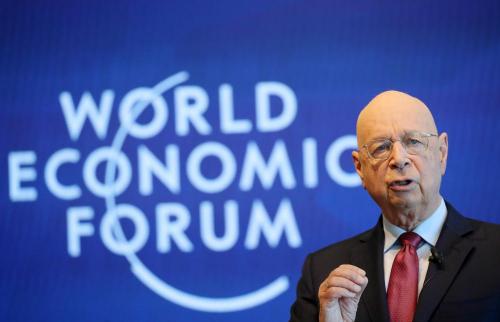
https://www.weforum.org/agenda/2020/10/coronavirus-covid19-recovery-capi...
12th October, 2020
No event since World War II’s end has had as profound a global impact as COVID-19. The pandemic has triggered a public health and economic crisis on a scale unseen in generations and has exacerbated systemic problems such as inequality and great-power posturing.
The only acceptable response to such a crisis is to pursue a “Great Reset” of our economies, politics, and societies. Indeed, this is a moment to re-evaluate the sacred cows of the pre-pandemic system, but also to defend certain long-held values. The task we face is to preserve the accomplishments of the past 75 years in a more sustainable form.
In the decades after WWII, the world made unprecedented strides toward eradicating poverty, reducing childhood mortality, increasing life expectancy, and expanding literacy. Today, international cooperation and trade, which drove the post-war improvement in these and many other measures of human progress, must be maintained and defended against renewed skepticism of their merits.
Have you read?
At the same time, the world also must remain focused on the defining issue of the pre-pandemic era: the “Fourth Industrial Revolution” and the digitization of countless economic activities. Recent technological advances have given us the tools that we need to confront the current crisis – including through the rapid development of vaccines, new treatments, and personal protective equipment. We will need to continue to invest in research and development, education, and innovation, while at the same time building protections against those who would misuse technology.
But other shibboleths of our global economic system will need to be re-evaluated with an open mind. Chief among these is the neoliberal ideology. Free-market fundamentalism has eroded worker rights and economic security, triggered a deregulatory race to the bottom and ruinous tax competition, and enabled the emergence of massive new global monopolies.
Trade, taxation, and competition rules that reflect decades of neoliberal influence will now have to be revised. Otherwise, the ideological pendulum – already in motion – could swing back toward full-scale protectionism and other lose-lose economic strategies.
Specifically, we will need to reconsider our collective commitment to “capitalism” as we have known it. Obviously, we should not do away with the basic engines of growth. We owe most of the social progress of the past to entrepreneurship and to the capacity to create wealth by taking risks and pursuing innovative new business models. We need markets to allocate resources and the production of goods and services efficiently, particularly when it comes to confronting problems like climate change. But we must rethink what we mean by “capital” in its many iterations, whether financial, environmental, social, or human. Today’s consumers do not want more and better goods and services for a reasonable price. Rather, they increasingly expect companies to contribute to social welfare and the common good. There is both a fundamental need and an increasingly widespread demand for a new kind of “capitalism.” To reconsider capitalism, we must reconsider the role of corporations. An early exponent of neoliberalism, the Nobel laureate economist Milton Friedman believed (quoting former US President Calvin Coolidge) that “the business of business is business.” But when Friedman pioneered the doctrine of shareholder primacy, he did not consider that a publicly traded company might be not just a commercial entity but also a social organism. Moreover, the COVID crisis has demonstrated that companies that invested in strengthening their long-term vitality have been better equipped to weather the storm. In fact, the pandemic has hastened the shift toward a stakeholder model of corporate capitalism, following the US Business Roundtable’s embrace of this concept last year. But for more socially and environmentally conscious business practices to stick, companies need clearer guidelines. To meet that need, the World Economic Forum’s International Business Council has developed a set of “Stakeholder Capitalism Metrics,” so that businesses can get on the same page when it comes to assessing value and risks. If the COVID crisis has shown us anything, it is that governments, businesses, or civil-society groups acting alone cannot meet systemic global challenges. We need to break down the siloes that keep these domains separate, and start to build institutional platforms for public-private cooperation. Equally important, younger generations must be involved in this process, because it is inherently about the long-term future. Finally, we must expand our effort to recognize the diversity of backgrounds, opinions, and values among citizens at all levels. We each have our individual identities, but we all belong to local, professional, national, and even global communities with shared interests and intertwined destinies. The Great Reset should seek to lend a voice to those who have been left behind, so that everyone who is willing to “co-shape” the future can do so. The reset that we need is not a revolution or a shift to some new ideology. Rather, it should be seen as a pragmatic step toward a more resilient, cohesive, and sustainable world. Some of the pillars of the global system will need to be replaced, and others repaired or strengthened. To achieve shared progress, prosperity, and health requires nothing more – or less.










Add new comment